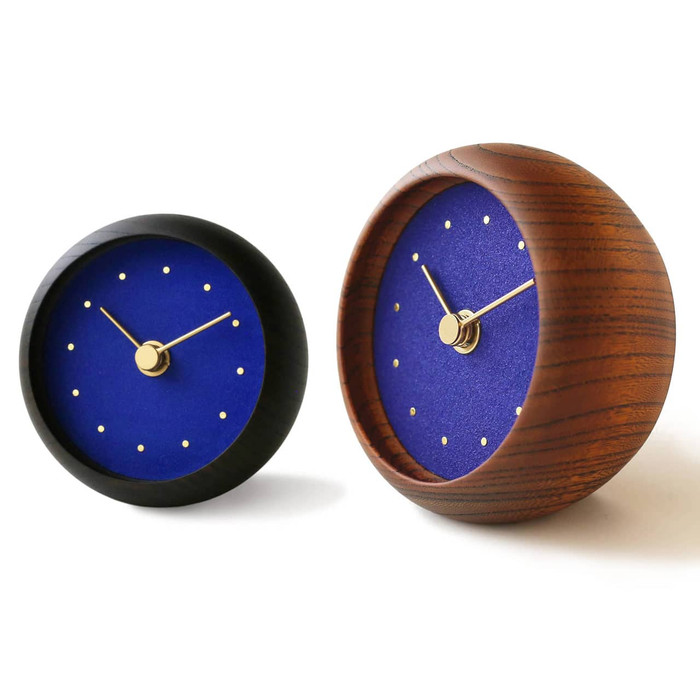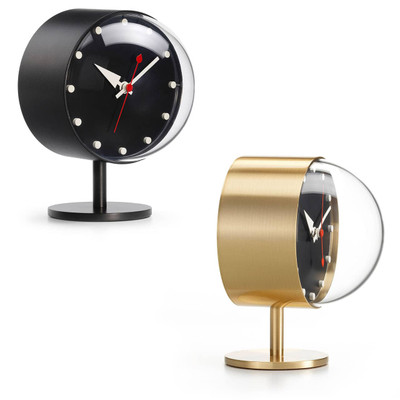-
About This Work
Video: Making the Hanamokko desk clock by C-Brain (Kanazawa, Japan)
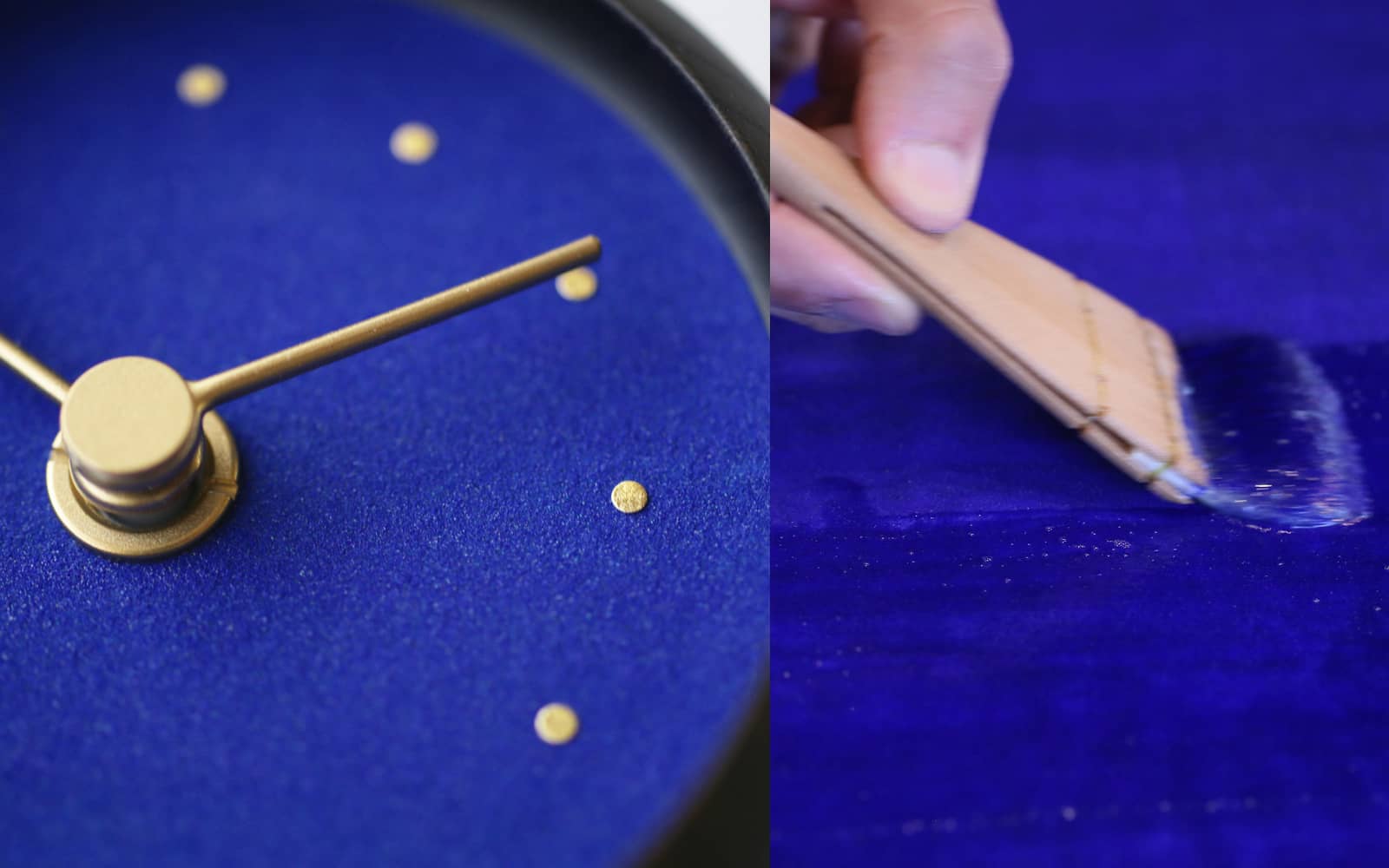 Applying 10 layers of mineral pigments (iwa-enogu) evenly requires great skill is done by an experienced artisan. Shown: Azurite
Applying 10 layers of mineral pigments (iwa-enogu) evenly requires great skill is done by an experienced artisan. Shown: Azurite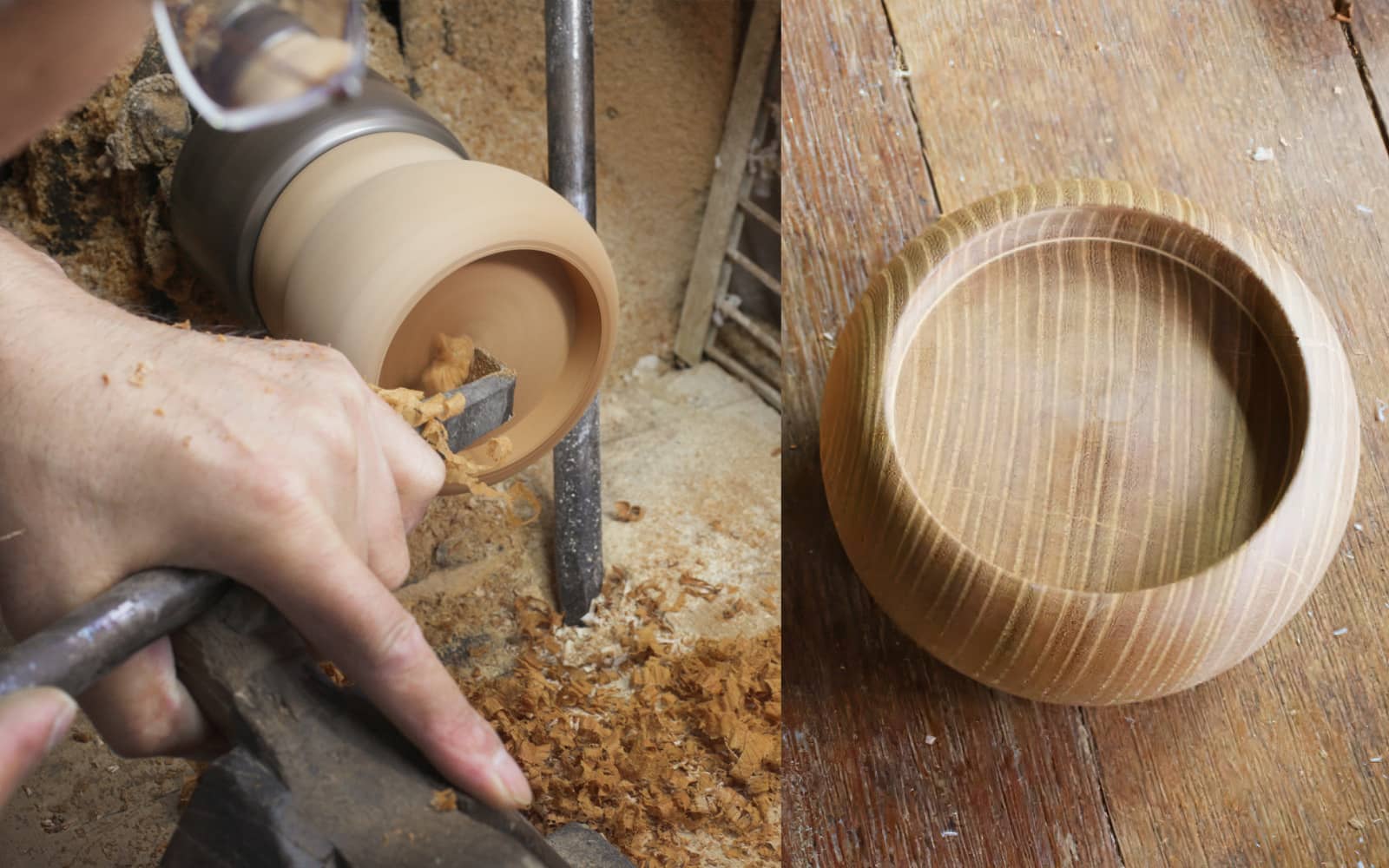 Each wooden body is handmade using a traditional technique called “rokuro hiki” where a blade is applied to a rotating tree and shapes the form.
Each wooden body is handmade using a traditional technique called “rokuro hiki” where a blade is applied to a rotating tree and shapes the form.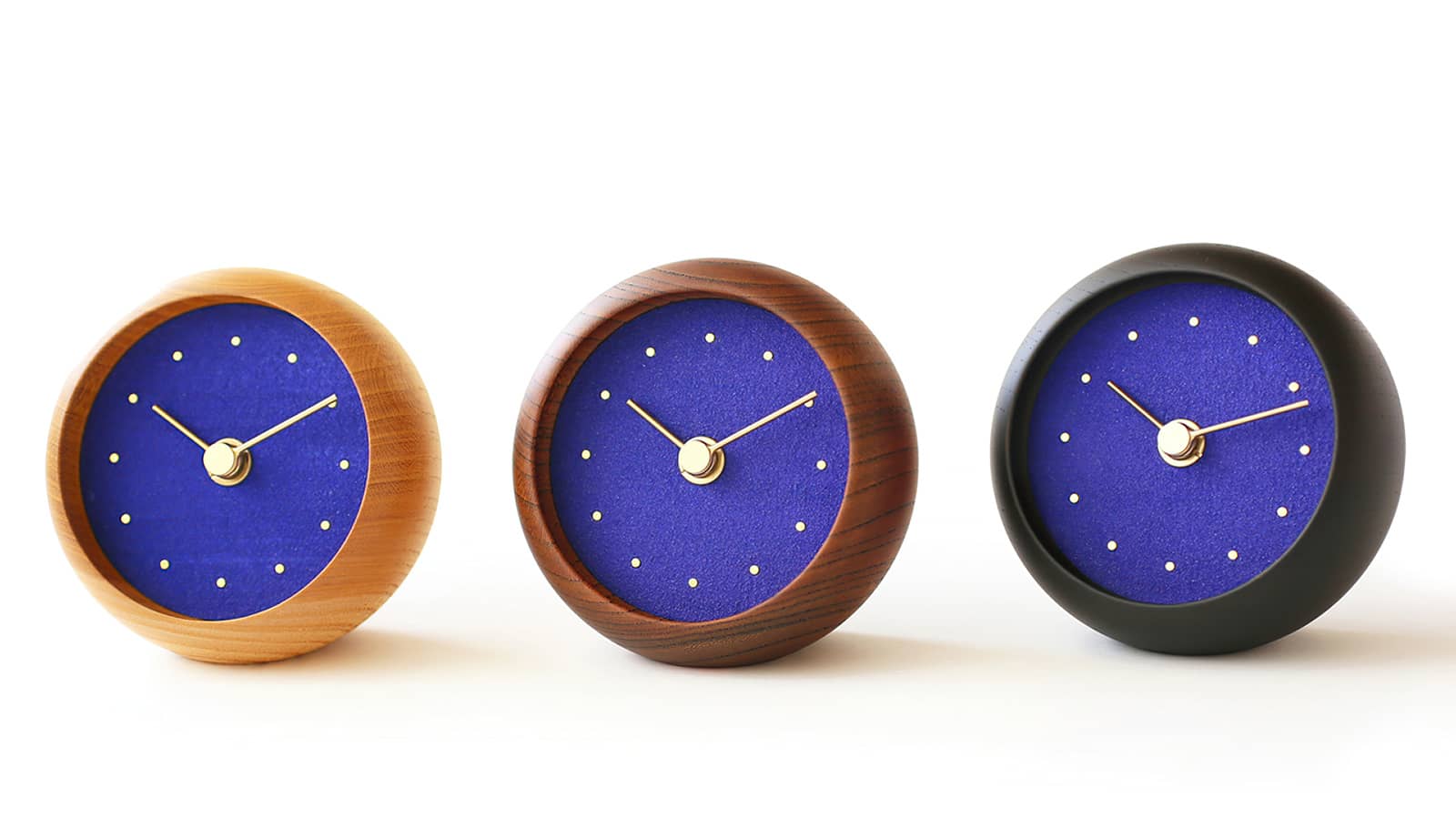 Gunjo with natural, brown or black stained Zelkova wood protected with a polyurethane coating.
Gunjo with natural, brown or black stained Zelkova wood protected with a polyurethane coating.C-Brain's Hanamokko Clock is a charming table clock with a minimalist, rounded, wood form and vibrant dial. Alongside a modern, stylish appearance, it is committed to traditional Japanese materials and techniques. Designed by Ko Ushijima, handmade in Japan.
THE DIAL
The Hanamokko Clock’s colorful dials are hand painted with crushed mineral pigments or “rock paint” and the hour markers are hand-applied gold leaf discs. The clock face surface has a sand-like texture. While some shades are unique takes on pastels, others use different mineral pigments to create deep, vibrant hues. Special editions utilize other traditional art processes.Mineral Pigments: Applying mineral pigments (iwa-enogu) evenly can only be done by an experienced artisan and C-Brain works with a Japanese painter with more than 25-years of experience. The process involves ten coats, each one needing to dry before the next is applied. Mineral pigments were introduced to Japan when Buddhism brought with it new pigmentation materials. While today most paint is synthetic and artificial, these natural paints have been used for centuries with almost no change in technique.
Gold Leaf: The twelve dots that indicate the hour are gold leaf adhered to handmade Japanese paper, which is then punched into a circle and pasted by hand onto the face. Gold leaf shines, making it easier to tell time in low light.
Paper: The mineral pigments and gold leaf are applied to washi kozo—a type of Japanese paper known for its strength and ability to hold mineral pigments—and then adhered to the wooden base. Mr. Mayumi Ishikawa, a washi paper maker in Futamata-cho, Kanazawa prepares the bases for the mineral pigments. Washi kozo paper is the invisible support and unsung hero of these chic clocks. For the “Surihaku” series, Ishikawa also makes dials using a Japanese paper called rakusui-gama that has a linear pattern. In this series, gold or silver foil is applied only to the convex part of the paper’s uneven surface and made to blur, giving the impression of a landscape, like the surface of water or clouds.
THE BODY
The wooden body of the table clock was produced by Mr. Tatsuya Kutsumi, a traditional craftsman woodworker from Yamanaka Onsen, Kaga City, Ishikawa Prefecture—a region with a history of more than 400 years of lacquerware production. Each wooden body is handmade using a traditional technique called “rokuro hiki” where a blade is applied to a rotating tree, gradually and delicately shaping the form. A hardwood and native to Japan, Zelkova has a beautiful grain and has been a desirable material for furniture and construction since ancient times. A natural product, the wood’s grain and color will vary in each clock. The three color options are natural and a brown or black stain. All have a polyurethane coating to protect the wood.LEATHER COVER
The back of the table clock includes a removable protective leather cover. In addition to enhancing the appearance, it absorbs the faint internal ticking sounds made by the nearly-silent Seiko quartz movement. Mindful of waste, scraps that are produced in the process of making leather straps for wristwatches are re-purposed for the desk clocks. The leather cover is engraved with the C-Brain logo and also can be custom engraved with a corporate or personal message. -
Technical Specs
- MEASUREMENTS
- Hanamokko: 3.8" x 3.8" x 2.1" (9.6 x 9.6 x 5.3 cm); 4.7 oz (133 g) *without battery
- Hanamokko Tou: 5" x 5" x 2.5" (12.7 x 12.7 x 6.4 cm); 10.5 oz (297 g) *without battery
- FUNCTIONS
- Displays hours and minutes
- MOVEMENT
- Seiko quartz silent sweep movement
- 1.5v / AA battery powered (lithium battery included)
- MATERIALS
- Designed & handmade in Japan
- Pulverized natural mineral paint dial
- Gold leaf hour markers
- Japanese Zelkova hardwood body
- Natural or stain finish sealed with urethane coating
- Repurposed leather back
- Luxury gift box
- WARRANTY
- 5 year movement warranty
- Movement is reparable/replaceable
-
Quick Help & Manual
-
Setting the time
Remove the leather cover by pulling the leather tab, and turn the time adjustment wheel so the hands rotate in a clockwise direction. It is ok if the hands move slightly counter-clockwise if you are adjusting for a few minutes. Never set the time by manipulating the hands directly. Replace the leather cover when finished.
-
Battery
The clock is powered by one AA 1.5v battery. We ship with an Energizer lithium long lasting leak-proof battery that should last for several years. We also recommend Duracell alkaline batteries. It is important to remove or replace the battery once it stops working to prevent battery leakage and damage. Using a good battery helps extend the life of the movement.
When replacing the battery, lift the old battery out from the right (negative side). You may need to use a flathead screwdriver to gently assist in prying the battery out. Insert the new battery from the right (negative side) first by pushing into the spring, and then push down the positive (left) side.
-
Custom engraving
For a small fee, we can custom engrave a short message (and some logos) on the back leather piece. For larger coporate orders, it is possible to engrave the entire back.
-
Care and maintenance
Clean the clock occasionally with a soft microfiber cloth. The Zelkova wood is sealed with a clear polyurethane coat to resist wear. The mineral pigment dial is scratchable and should be carefully dusted with a soft brush or handheld blower (for cameras and small electronics). Change the battery as soon as the clock slows or stops. If you need to store your clock for a lengthy period, please remove the battery.
-
Where not to display
Avoid exposing the clock to direct sunlight to prevent the natural pigments from fading. Do not place in a very humid environment as warping and/or mold growth may occur.
-
Return policy
We know selecting the 'right' Hanamokko clock variant can be a difficult decision. As a store policy we do not accept returns, but if you are debating between 2 clocks, we will allow you to purchase 2 and return 1. Please contact us first. Also contact us in advance with all questions before purchasing and we will be happy to share our insight about specific colors. It is easier for everyone if we get it right the first time. Please contact us immediately if your clock arrives damaged or is malfunctioning. Though rare, these are mechanical works and occassionally have issues.
-
Warranty & repairs
C-Brain clocks are guaranteed against defects under normal use, for 2 years on parts & labor from the date of purchase. Normal wear and tear damage or defects are excluded from warranty after 2 years. If purchased through Clock Forward, the movement is covered an additional 3 years (5 years total) warranty. We make the return and exchange process as simple as possible.
All mechanical parts are repairable and/or replaceable. Please contact us if you have any problems throughout the life of your clock—whether in or out of warranty.
-
Setting the time
-
Pre-Sale Questions
Please email or call the gallery with any question 1-704-981-0636.
-
How is the Hanamokko Tou different from the Hanamokko?
Hanamokko Tou is created exclusively for Clock Forward. Tou, meaning 10, refers to the 10cm face diameter and 10oz weight. It shares the same form, process, skilled artisans and materials as the smaller Hanamokko. It is more substantial with a clock face that is 57% larger and a weight that is more than double. Hanamokko Tou may show better in a larger interior and some may find it to be a more luxurious gift. Hanamokko Tou is numbered and created in small batches of 50 total, with a production time of 6-8 months. Very limited quantities of select variants are produced. You can secure your preference by pre-ordering.
-
Where will my clock ship from?
All clocks ship directly from Clock Forward in NC. We try to keep most smaller variants in stock, while there is currently a very finite supply of the Tou. If we need to custom order your selection, it will ship to us from Japan first for inspection and customs clearance. For multiple purchases, corporate gifts and deadline sensitive orders, please contact us before purchasing.
-
Where are Hanamokko clocks made?
From the carved wooden bodies and native Zelkova wood to the hand-painted faces, all production takes place in Japan. The movement is made by Seiko in Thailand.
-
Is there a customs fee?
No, we handle importing and ship directly to you from the US. There is no additional customs charge or hassle.
-
Which Hanamokko clock has the highest visibility?
The Hanamokko Tou has a larger face and hour markers and is typically a better choice for larger interiors. We also recommend variants that either have dark hands on a light face or light hands on a dark face for highest visibility.
-
What is iwa-enogu?
Iwa-enogu is paint made from pulverized natural minerals. Mineral pigments were introduced to Japan 1400 years ago during the Asuka period. The pigment is known for its lightfastness, durability, color saturation, gritty texture and matt glimmering qualities. It is skillfully brushed in multiple layers onto a surface (ground) with a binder. On the Hanamokko Clock, the ground is paper made by Mayumi Ishikawa in Kanazawa City. The paper is then carefully adhered to the Zelkova wood body. Although durable, iwa-enogu surfaces can be scratched and should be treated like any painting.
-
What is rokuro-hiki?
Rokuro-hiki is a process where wood is rotated on a potter's wheel (rokuro) and shaped with a sharp blade. It is carved in the Yamanaka region—known for its lacquerware dating back to the 1500s.
-
Is the clock movement silent?
There is no ticking sound. The clock runs on a battery-operated silent sweep Seiko quartz mechanical movement. It is suitable for bedside display.
-
Is the clock readable in the dark?
No. It does not glow in the dark nor is there an LED light. It is viewable in low lighting if some light catches the clock. There is no current plan to add this functionality.
-
Is there an alarm?
No. There is no alarm on this clock.
-
How long do the movements last before requiring service?
With the proper care, quartz clock movements can last 15-20 years. They are reliable and inexpensive to replace. The movement is covered under a 5 year warranty for Clock Forward customers. For purchases out of warranty, we will have a replacement kit and instructions available.
-
How do you custom engrave?
We engrave the back leather cover of the clock below the logo using a CO2 laser. It's a small surface area, so be brief. Please allow an additional 1-2 weeks for engraving. For larger orders, it is possible to engrave blank leather backs without the C-Brain logo. Large orders are engraved by the factory.
-
How is the Hanamokko Tou different from the Hanamokko?

